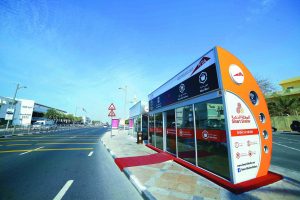Shipping Smart
Dubais air conditioned bus stops are being transformed into service providing Smart Shelters offering commuters everything from bill payments to lunch on the go. But the shelters are also looking to transform shipping and last mile delivery services. Logistics News ME reports
It isnt just technology that makes a city smart but citizen engagement, and a key method of fostering that engagement is through the renovation of urban infrastructure. In Dubais plans to become the first Smart City in the Middle East it has rolled out more than 500 initiatives, including integrated public services, and it isnt just smart that the city is aiming for, but happy also.
Under the plans to digitise and connect more and more of the physical emirate, as well as the services that make it tick, certain areas of business are set to benefit from a raft of new opportunities.
Already eyeing a near four-fold increase in its value, the e-commerce industry is set to increase in value from $2.5bn currently by Dubai Chambers calculations, to $10bn by 2018. Aramex is already seeing gains with a 13% increase in revenue recorded in Q1 2016, compared to Q1 2015, and other couriers are following suit, driven not just by e-commerce but the heightened demand for goods and documents to be transported securely and quickly.
However convenient these services are to the end user, efficiency behind the scenes can always be improved and so a tri-party PPP agreement between service providers and Dubai Road and Transport Authority (RTA) is about to provide that platform in the citys air conditioned bus shelters.
Enhanced to become a kerbside retail concept providing on-the-go convenience products and services to the estimated 80% of the Dubai population that is dependent on public transport, the new Smart Shelters are located in densely populated urban centres such as Jumeirah, Satwa, Karama, Bur Dubai, Deira and others.
The concept created and exclusively operated by Al Shamil Foodstuff Trading, in partnership with the RTA and Right Angle Media will see 100 shelters out of the total 656 locations in the city converted to Smart Shelters, based on their connectivity and proximity to densely populated urban centres.
Smart Shelters will be open all day every day, with services including free WiFi, mobile charging, Nol and telecom recharge, bill payments and mini-market shopping, in addition to courier services.
Al Shamil, which began its partnership with RTA by providing catering services on the Dubai Abu Dhabi bus routes, proposed the idea and embarked on a two year feasibility and research study to ensure the idea would provide optimum benefits for the partners who operate in the shelters and the commuters who will use them.
With RTA we ran an extensive survey of commuters to understand the challenges that exist, the needs of the public and how the removal of half the seating in a shelter would affect their experience, explains Rohit Dalmia, MD of Al Shamil Foodstuff Trading.
Courier services are a daily necessity for the shipment of documents and parcels. In addition people are ordering online much more now than before and consumers want two things: close delivery, preferably on their doorstep and to minimise what they pay in shipping costs, he adds.
Philippine shipping company LBC, which has operated a drop and ship service at Smart Shelters for three months, is already in discussions about renewing its contract and expanding to double the number of outlets in three to six months.
Youre not forcing the customer to come to you, LBC has gone to where its target market lives and commutes and they have realised that there is a huge amount of cost saving. They have their own logistics services shuttling between the shelters to pick up the cargo instead of going door to door to every home. So they have had huge savings by making their logistics more efficient and the customers love it because they are close by and it both makes and saves money, Dalmia continues.
 Scaling up the model
Scaling up the model
Not every smart shelter will provide courier services and, the international shipping services provided by the LBC contract aside, there is room for only one courier in the plans.
Dalmia explains: Its a first move opportunity and the first company to come in and take locations will have that reach. We want a good mix of products in each shelter and there is room for one large player.
There are options to brand the entire shelter, staff or automate through a locker system and its also possible for an e-commerce site to have its own locations across the city, cut out the courier, and do a direct drop to buyers. With operating costs estimated at AED100,000 per year per shelter, the flexibility exists to scale up operations until profit margins show the desired return.
Its a means by which to monetise public infrastructure in a way that also provides services for commuters and opportunity for businesses.
Dalmia explains: We want to select one partner that is big and strategic enough and we want that partner to take a number of units across the city. You can cover every corner of Dubai with only 15 or 20 shelters. Just like malls are cautious about their tenant mix, we are also careful to make sure services here dont overlap. We cant have two competing services within a close proximity and while we dont do exclusive contracts, we need to make sure new partners dont impact on the business of current partners.
As such, its a model that would work alongside the locker system that can be seen in Dubais gas stations because, as Smart Shelters initial research found, only 20% of Dubais population drives a car; regardless of how much higher that may seem at certain times of the day.
While it would be easy to think the idea can only work in a city that lacks a unified postal system, the popularity of the concept to date begs to differ. The idea has been well received in the market, with discussions ongoing between Al Shamil and a number of service providers, not to mention governments with an eye on rolling out more of their own smart initiatives, including in Iceland, Saudi Arabia, Mauritius and Bangladesh.
I think what is happening is a lot of these projects are actually initiated by the respective governments. The Mauritian government for example issued a tender for the insulation of smart bus stops across the country and they approached us to provide a complete solution they will franchise from us and offer to the government. How the funding model will work from there is yet to be decided but people are now looking to us as the authority on infrastructure in public places.
We are looking at how we can replicate this model and we are also in touch with a leading transport association in Chicago. Everybody has different requirements but the trend here is to monetise public infrastructure beyond the advertisement model, Dalmia concludes.





